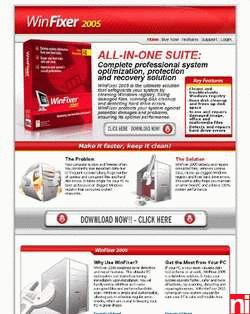Adware, often called advertising-supported software by its developers, is software that generates revenue for its developer by automatically generating online advertisements in the user interface of the software or on a screen presented to the user during the installation process. The software may generate two types of revenue: one is for the display of the advertisement and another on a "pay-per-click" basis, if the user clicks on the advertisement. Some advertisements also act as spyware, collecting and reporting data about the user, to be sold or used for targeted advertising or user profiling. The software may implement advertisements in a variety of ways, including a static box display, a banner display, a full screen, a video, a pop-up ad or in some other form. All forms of advertising carry health, ethical, privacy and security risks for users.
Kazaa Media Desktop. was a peer-to-peer file sharing application using the FastTrack protocol licensed by Joltid Ltd. and operated as Kazaa by Sharman Networks. Kazaa was subsequently under license as a legal music subscription service by Atrinsic, Inc., which lasted until August 2012.
Shareware is a type of proprietary software that is initially shared by the owner for trial use at little or no cost. Often the software has limited functionality or incomplete documentation until the user sends payment to the software developer. Shareware is often offered as a download from a website. Shareware differs from freeware, which is fully-featured software distributed at no cost to the user but without source code being made available; and free and open-source software, in which the source code is freely available for anyone to inspect and alter.
Spyware is any software with malicious behavior that aims to gather information about a person or organization and send it to another entity in a way that harms the user by violating their privacy, endangering their device's security, or other means. This behavior may be present in malware and in legitimate software. Websites may engage in spyware behaviors like web tracking. Hardware devices may also be affected.
Claria Corporation was a software company based in Redwood City, California that invented “Behavioral Marketing”, a new form of online advertising. It was founded in 1998 by Denis Coleman, Stanford MBA Sasha Zorovic, and engineer Mark Pennell, based on work Zorovic had done at Stanford. In March 1999 Jeff McFadden was hired as CEO and Zorovic was effectively forced out.

BonziBuddy was a freeware desktop virtual assistant created by Joe and Jay Bonzi. Upon a user's choice, it would share jokes and facts, manage downloads, sing songs, and talk, among other functions, as it used Microsoft Agent.

Scareware is a form of malware which uses social engineering to cause shock, anxiety, or the perception of a threat in order to manipulate users into buying unwanted software. Scareware is part of a class of malicious software that includes rogue security software, ransomware and other scam software that tricks users into believing their computer is infected with a virus, then suggests that they download and pay for fake antivirus software to remove it. Usually the virus is fictional and the software is non-functional or malware itself. According to the Anti-Phishing Working Group, the number of scareware packages in circulation rose from 2,850 to 9,287 in the second half of 2008. In the first half of 2009, the APWG identified a 585% increase in scareware programs.
Direct Revenue was a New York City company which distributed software that displays pop-up advertising on web browsers. It was founded in 2002 and funded by Insight Venture Partners, known for creating adware programs. Direct Revenue included Soho Digital and Soho Digital International. Its competitors included Claria, When-U, Ask.com and products created by eXact Advertising. The company's major clients included Priceline, Travelocity, American Express, and Ford Motors. Direct Revenue's largest distributors were Advertising.com and 247 Media. In October 2007, Direct Revenue closed its doors.

BlueHippo Funding, LLC was an installment credit company operating in the USA founded by Joseph Rensin that claimed to offer personal computers, flat-screen televisions and other high-tech items for sale to customers with poor credit. In an article published November 25, 2009 titled BlueHippo files for bankruptcy: Company blames its bank; was accused of violating settlement with FTC, Eileen Ambrose reported that the company "was forced to file for protection under Chapter 11." On Wednesday December 9, 2009, the company filed for Chapter 7 bankruptcy after having its funds frozen by their payment processor. A petition to a Delaware bankruptcy judge to release the funds was denied. The company's advertised toll-free phone number and website are no longer functioning.
A registry cleaner is a class of utility software designed for the Microsoft Windows operating system, whose purpose is to remove redundant items from the Windows Registry.

WinFixer was a family of scareware rogue security programs developed by Winsoftware which claimed to repair computer system problems on Microsoft Windows computers if a user purchased the full version of the software. The software was mainly installed without the user's consent. McAfee claimed that "the primary function of the free version appears to be to alarm the user into paying for registration, at least partially based on false or erroneous detections." The program prompted the user to purchase a paid copy of the program.

In 2005 it was revealed that the implementation of copy protection measures on about 22 million CDs distributed by Sony BMG installed one of two pieces of software that provided a form of digital rights management (DRM) by modifying the operating system to interfere with CD copying. Neither program could easily be uninstalled, and they created vulnerabilities that were exploited by unrelated malware. One of the programs would install and "phone home" with reports on the user's private listening habits, even if the user refused its end-user license agreement (EULA), while the other was not mentioned in the EULA at all. Both programs contained code from several pieces of copylefted free software in an apparent infringement of copyright, and configured the operating system to hide the software's existence, leading to both programs being classified as rootkits.

Zango,, formerly ePIPO, 180solutions and Hotbar, was a software company that provided users access to its partners' videos, games, tools and utilities in exchange for viewing targeted advertising placed on their computers. Zango software is listed as adware by Symantec, and is also labeled as a potentially unwanted program by McAfee. Zango was co-founded by two brothers: Keith Smith, who served as the CEO; and Ken Smith, who served as the CTO.
Google Pack was a collection of software tools offered by Google to download in a single archive. It was announced at the 2006 Consumer Electronics Show, on January 6. Google Pack was only available for Windows XP, Windows Vista, and Windows 7.
Rogue security software is a form of malicious software and internet fraud that misleads users into believing there is a virus on their computer and aims to convince them to pay for a fake malware removal tool that actually installs malware on their computer. It is a form of scareware that manipulates users through fear, and a form of ransomware. Rogue security software has been a serious security threat in desktop computing since 2008. An early example that gained infamy was SpySheriff and its clones, such as Nava Shield.
Micro Bill Systems, also known as MicroBillSys, MBS and Platte Media, is an online collection service with offices in Leeds, England, considered to be malware. The company states that it is a professional billing company offering "software management solutions that can aid your business in reducing uncollectable payments." The company's best-known clients are online gambling and pornography sites offering three-day free trials of their subscription-based services. If users do not cancel during the trial period, the MBS software begins a repeating cycle of full-screen pop-up windows warning users that their account is overdue and demanding payment.
MS Antivirus is a scareware rogue anti-virus which purports to remove virus infections found on a computer running Microsoft Windows. It attempts to scam the user into purchasing a "full version" of the software. The company and the individuals behind Bakasoftware operated under other different 'company' names, including Innovagest2000, Innovative Marketing Ukraine, Pandora Software, LocusSoftware, etc.
In the middle of 2009 the Federal Trade Commission filed a complaint against Sears Holdings Management Corporation (SHMC) for unfair or deceptive acts or practices affecting commerce. SHMC operates the sears.com and kmart.com retail websites for Sears Holdings Corporation. As part of a marketing effort, some users of sears.com and kmart.com were invited to download an application developed for SHMC that ran in the background on users' computers collecting information on nearly all internet activity. The tracking aspects of the program were only disclosed in legalese in the middle of the End User License Agreement. The FTC found this was insufficient disclosure given consumers expectations and the detailed information being collected. On September 9, 2009 the FTC approved a consent decree with SHMC requiring full disclosure of its activities and destruction of previously obtained information.

1-800 CONTACTS v. WhenU.com was a legal dispute beginning in 2002 over pop-up advertisements. It was brought by 1-800 Contacts, an online distributor of various brands of contact lenses against WhenU SaveNow, a maker of advertising software. The suit also named Vision Direct, one of WhenU advertising customers, as a co-defendant. 1-800 CONTACTS alleged that the advertisements provided by WhenU, which advertised competitors of 1-800 CONTACTS when people viewed the company's web site, were "inherently deceptive" and that one of the advertisements "misleads users into falsely believing the pop-up advertisements supplied by WhenU.com are in actuality advertisements authorized by and originating with the underlying Web site".









